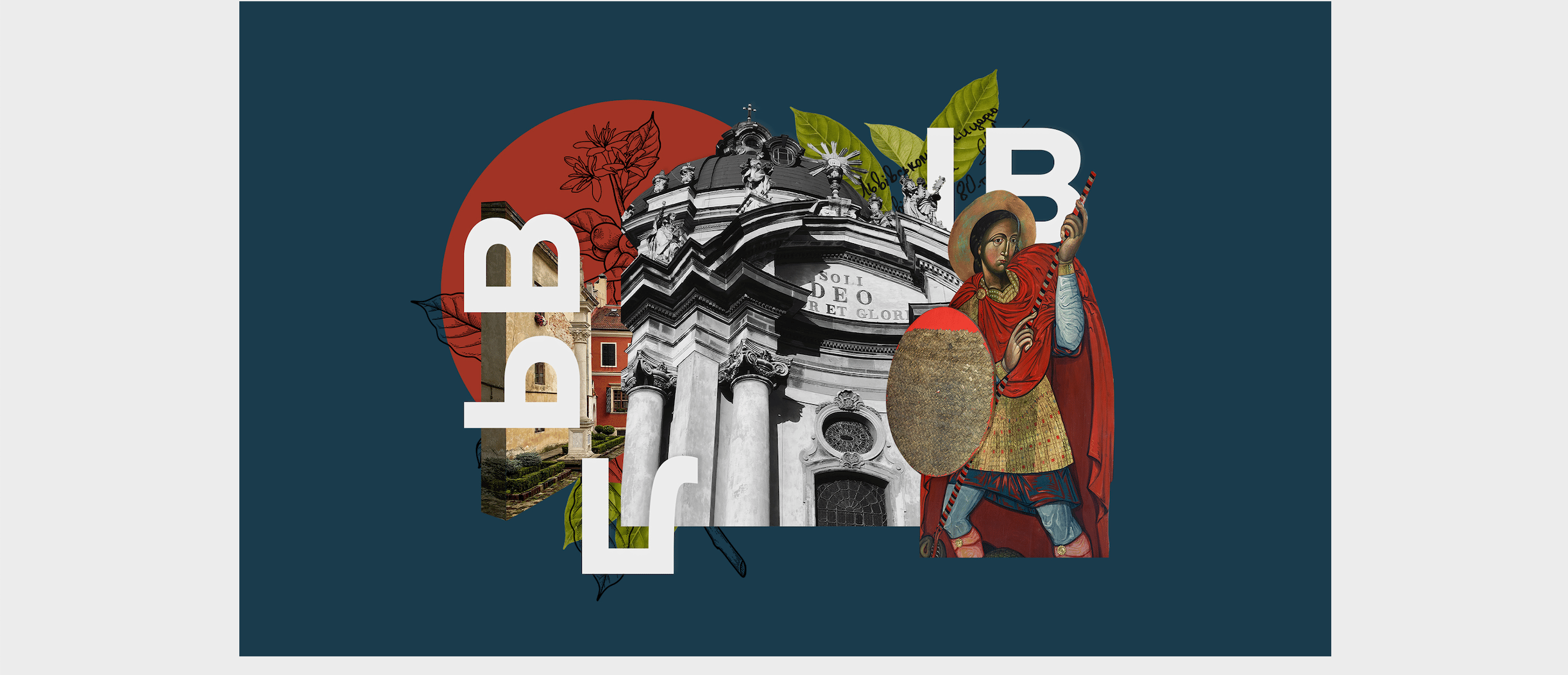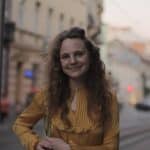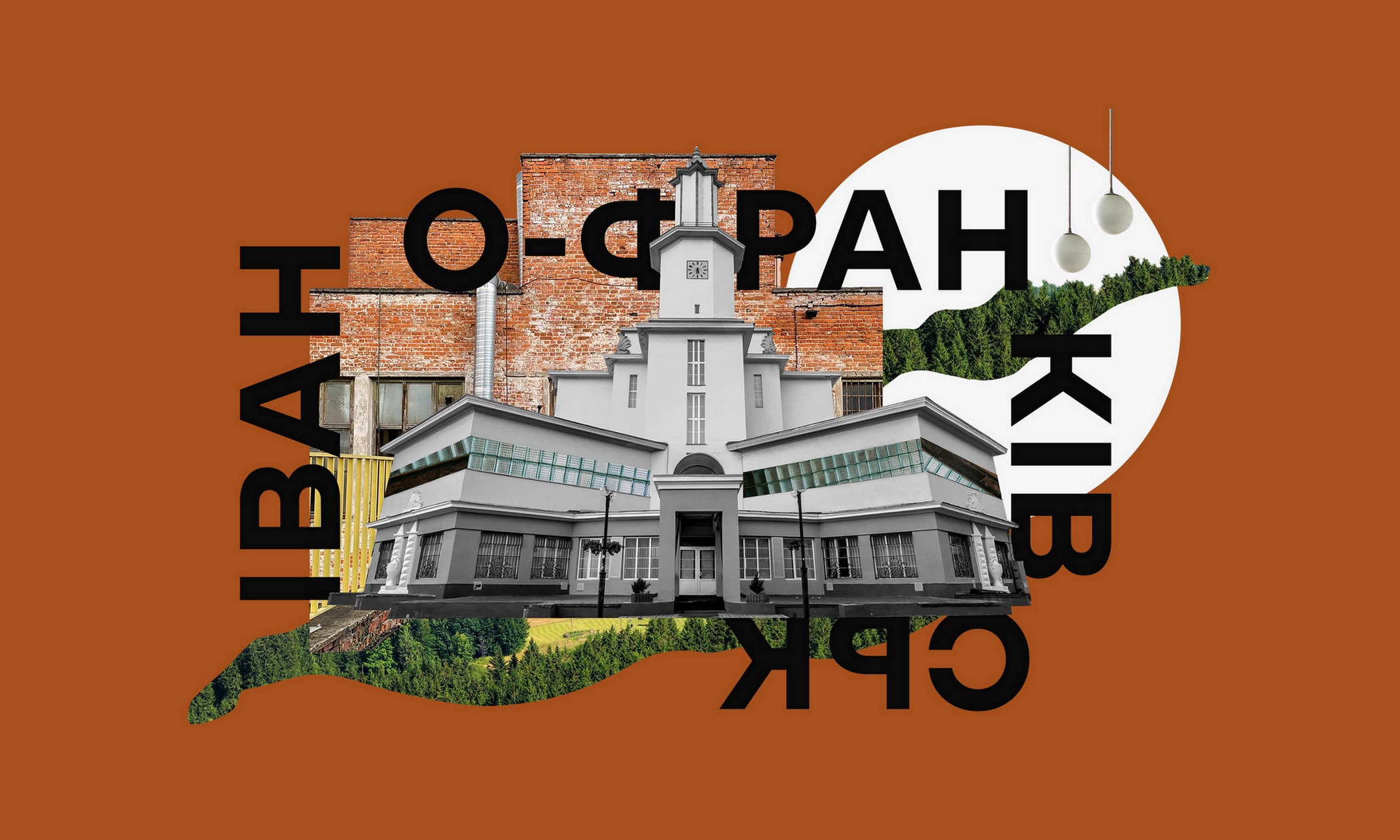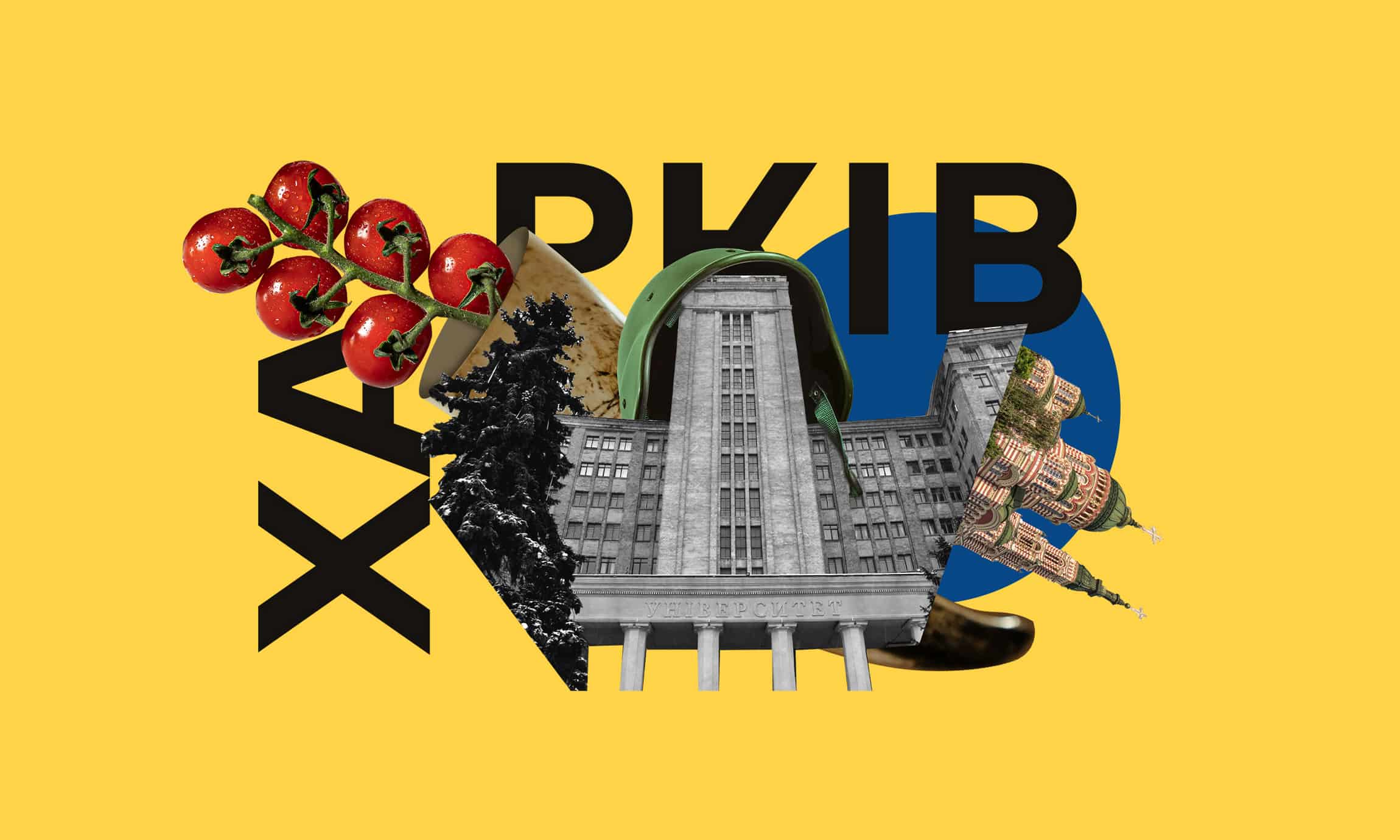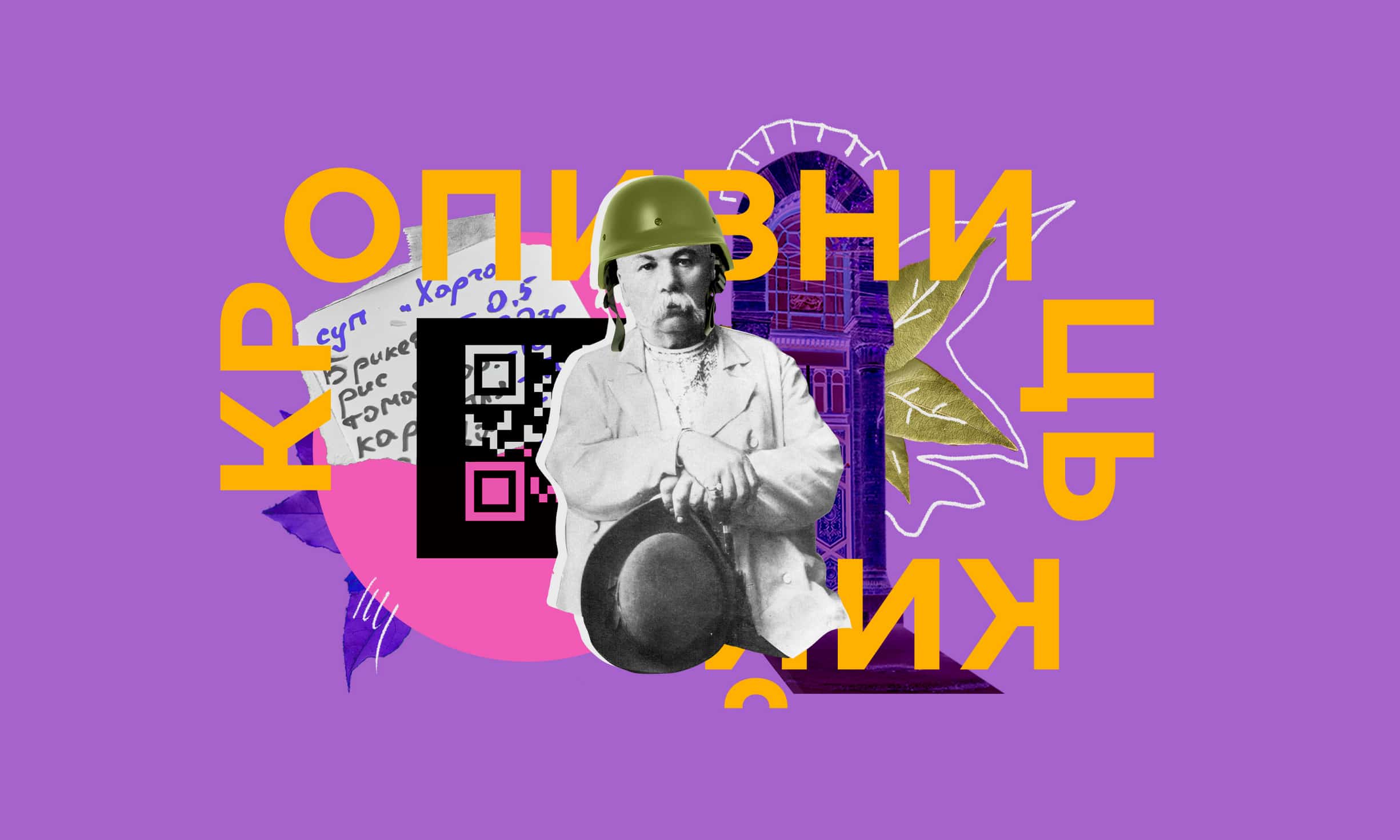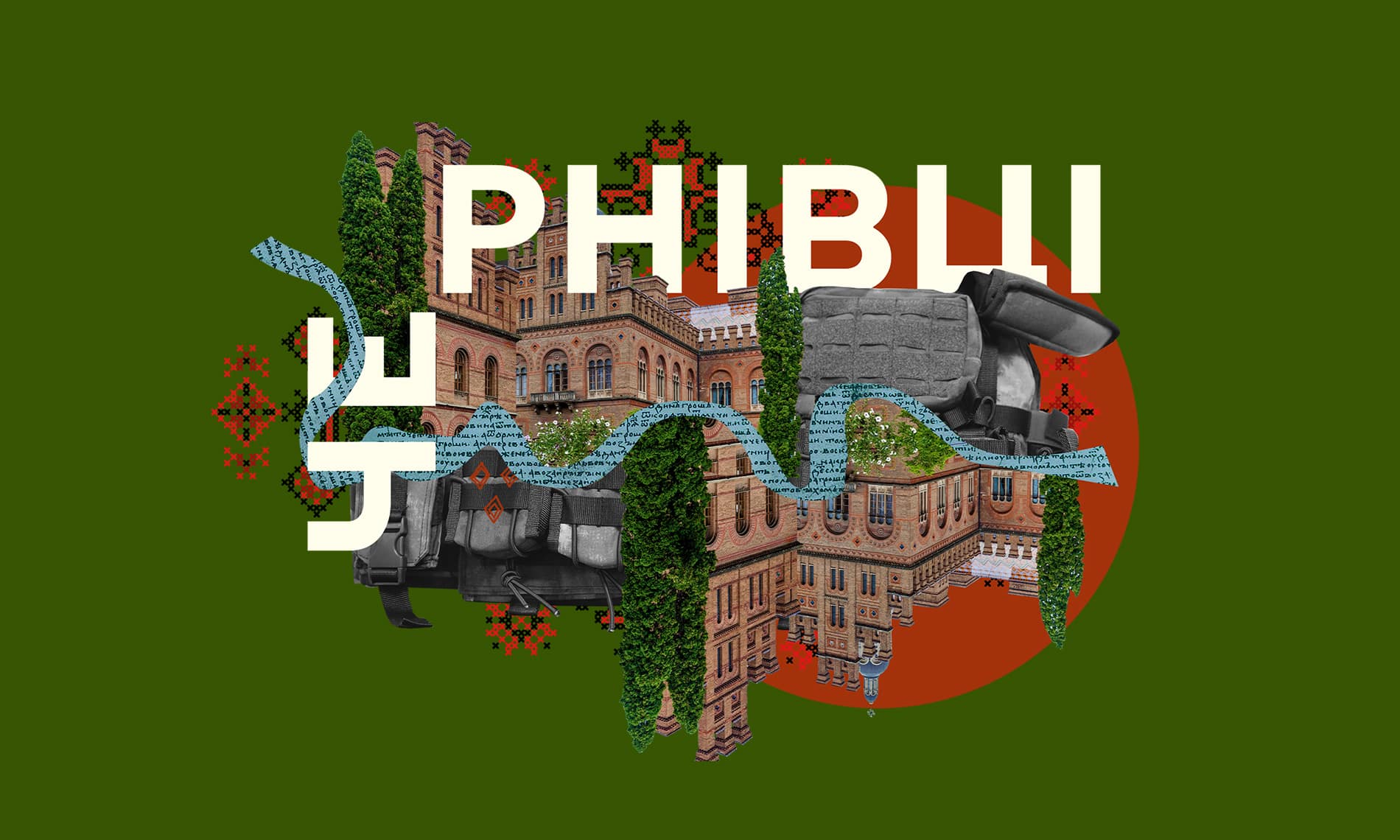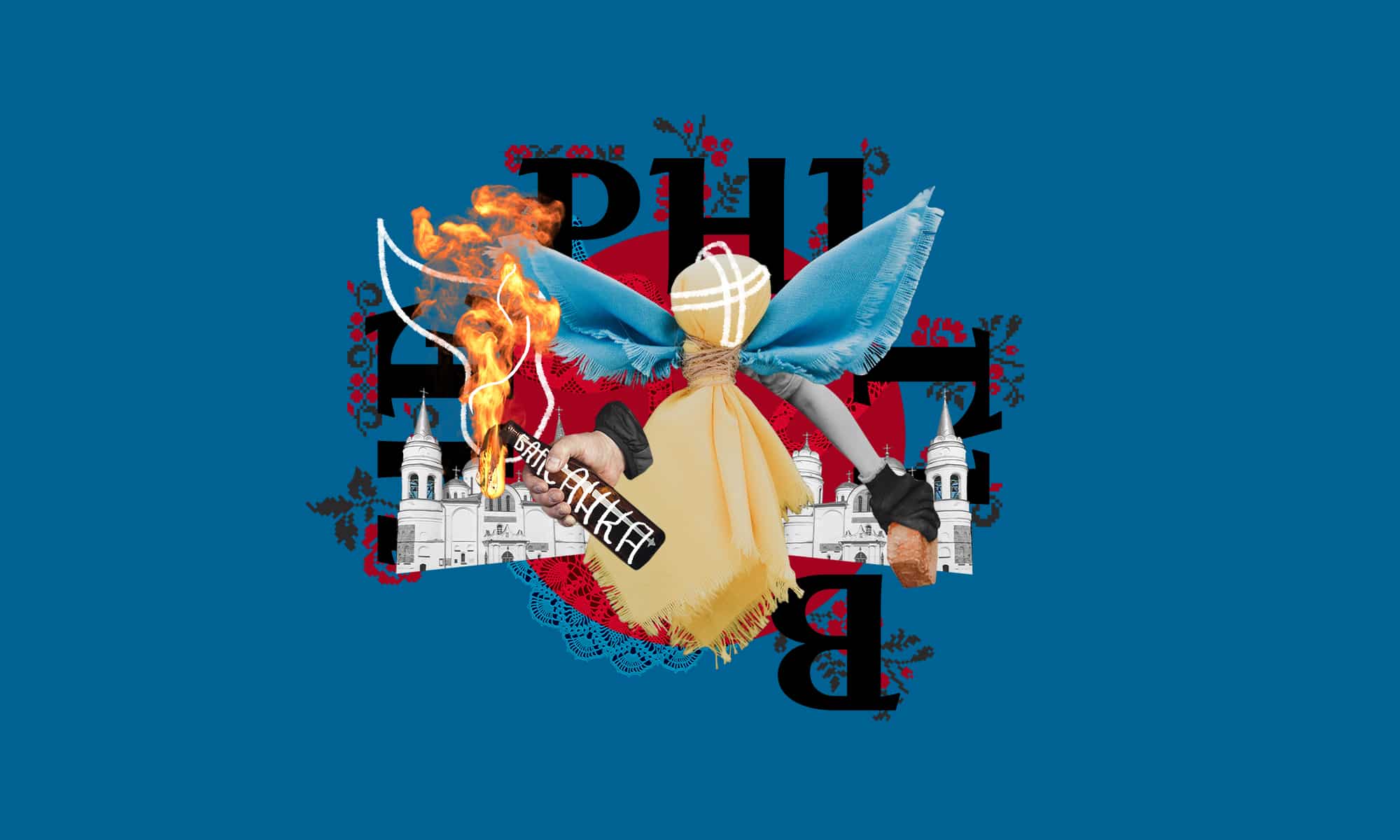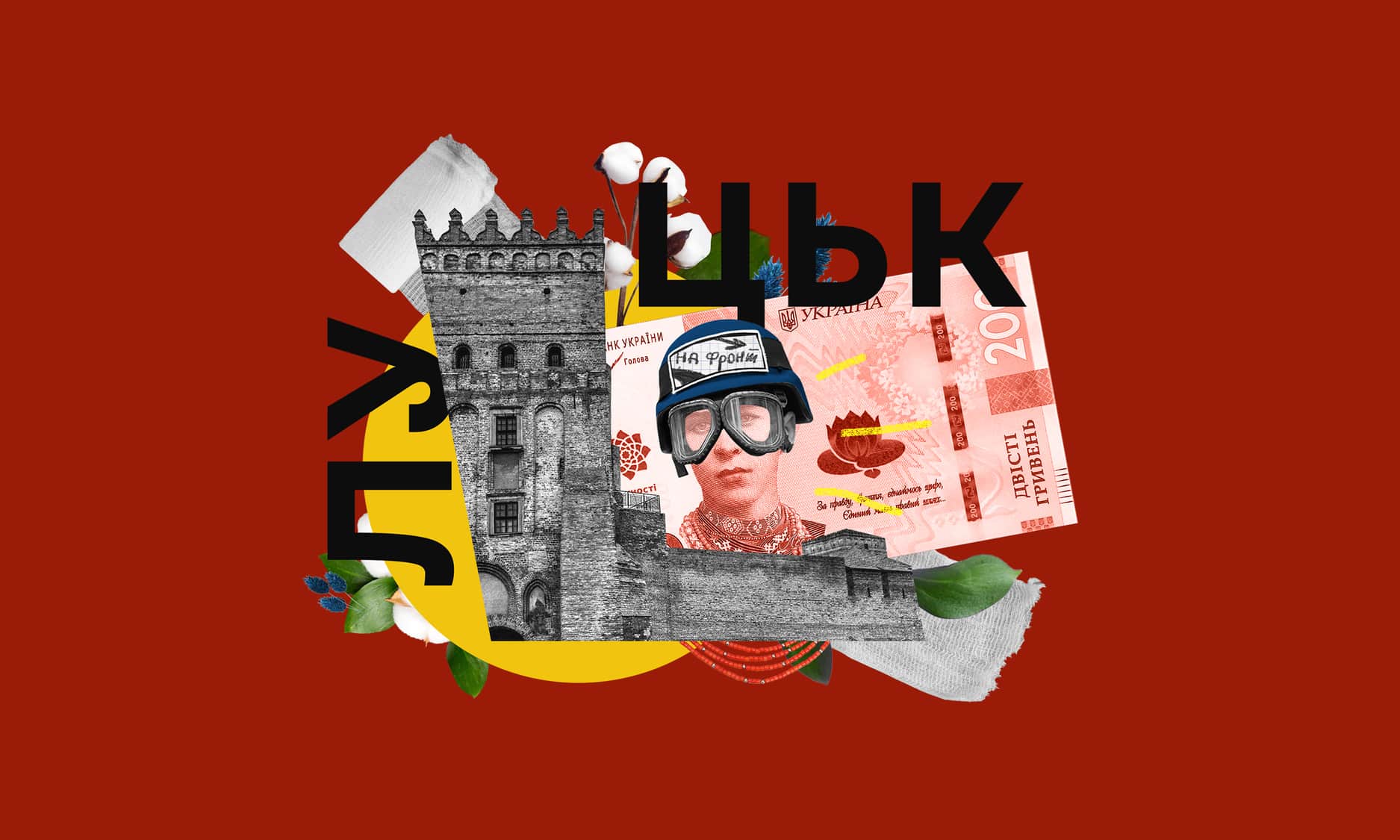In the first weeks of the Russian full-scale invasion Lviv was thronged by people. Soldiers were leaving the city to do their military service. Civilians were coming from everywhere in search of a safer place. Volunteers were helping everywhere and in every way they possibly could. Now the city is gradually reviving and adapting. Lviv’s terraces are now full of people, with theaters getting ready for a new season. Crowds gather to attend the concert of the Ukrainian ban «Zhadan and dogs».
However, war can be felt in the air: new coffee shops spring up, founded by those who have fled the war, artists are performing and raising funds for the Armed Forces of Ukraine, air raid sirens interrupt the regular flow of life. Nevertheless, soldiers keep heading East, with civilians finding shelter in the city. Volunteers are well aware of this. Their work has taken on a more systematic form now. They understand that it’s going to be a marathon, and not a short distance run.
You don’t win wars with socks
Andriy Salyuk, the coordinator of the organization «Lvivsky Lytsar» (the Ukrainian for «Lviv Knight» — translator’s note) and head of the Society for Preservation of Cultural Heritage, after several years of work in the field came to understand that volunteerism is a long-term process. He and his team have been helping the Ukrainian military since 2014. The center of his organization is located on the premises which form part of the former Sapihy Palace.
Before, the palace hosted lectures and tours. Currently, its entire space (from top to bottom) is filled with packages with medications and devices for the military. During the Revolution of Dignity an aid center was also operating here. The center was collecting clothes, food and bulletproof vests.
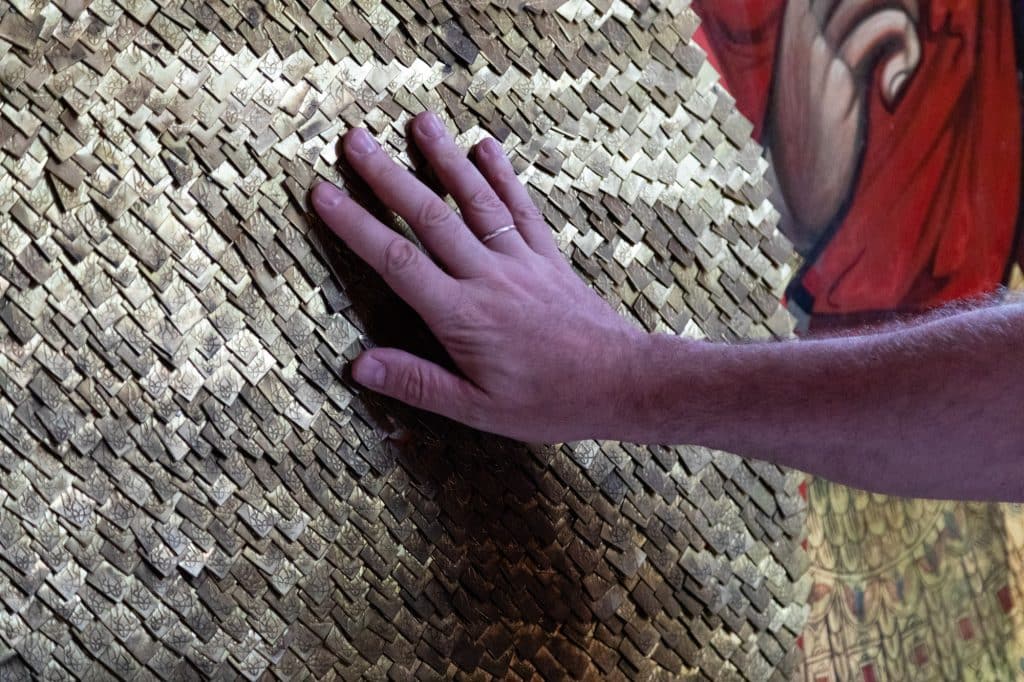
Andriy points to the mock-up of a Lviv knight as Saint Yuriy, on whose shields folder coat of arms are installed. This knight is the symbol of the organization that was launched back in the times when Lviv was being defended back during WWI. In 2014, when Andriy and his friends were thinking of how to name their group of fellow thinkers and volunteers, he called to mind this story from the last century.
In 1916, when Russian troops were approaching Lviv, its citizens started thinking about how they could reinforce the army to defend the city. A decision was made to raise funds. The sculptor Jan Juliusz Nalborczyk whittled a knight and put it on the place where the monument to Ivan Pidkova (a prominent Ukrainian Cossack ataman of the 16th century — translator’s note) used to stand. Everyone who donated money for the army had to drive a special military nail into the knight. In doing so, Lviv’s residents reinforced the knight’s armor, with their money reinforcing their own army. Now this monument is to be seen at the Lviv History Museum.
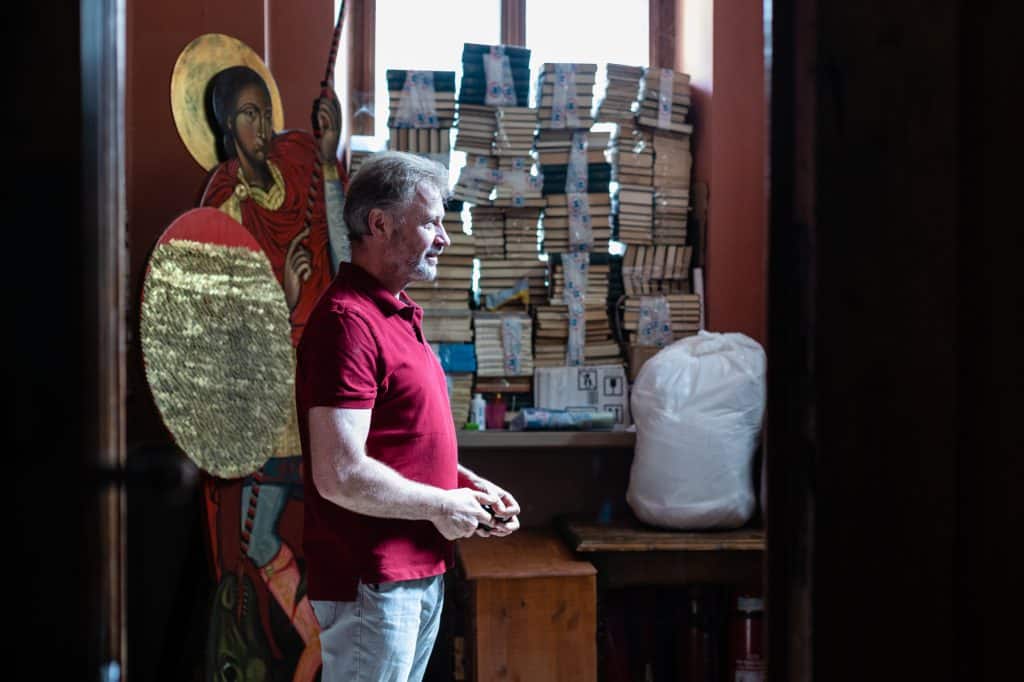
That’s how the name «Lvivsky Lytsar» came into being. Andriy’s friends created their own version of the monument. Roman Zelinskyi and Ostap Lozynskyi drew Saint Yuriy who is considered to be the protector of the Ukrainian army. It is placed on the ground floor of the palace, holding shields and with coats of arms installed on them.
When a person helps the organization, they hammer one such nail into the shield while taking one with them. Not once has Andriy taken his own tryzub (the Ukrainian coat of arms called «a gold trident» — translator’s note) off his rucksack in eight years. It is an important symbol to him. Now there is hardly a free spot on the shield, so only soldiers coming from the front are allowed to nail the coat of arms. The shields have also symbolic meaning. During the Revolution of Dignity those killed were carried off the Instytutska street on plywood shields.
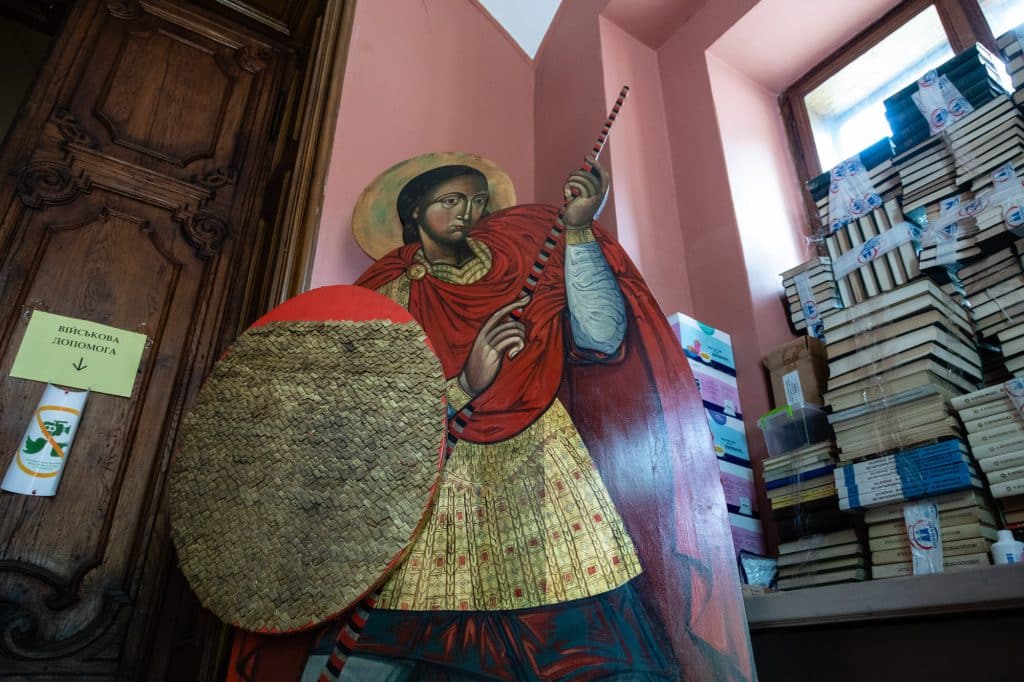
We are following Andriy upstairs where his team is working. Notes of appreciation from soldiers are hanging on every wall, chevrons of brigades which have been helped by the organization, Ukrainian flags and flags of its partners. Most staff members have been with the organization since 2014. They are helping in their own field of expertise aside from their main place of work. Roman is a journalist and his creativity helps him raise funds. Nataliya is in charge of logistics here, the field in which she is a pro. Another member of the team, Natalya’s namesake, is responsible for accountancy. Oleh mends old computers brought here by other people. These computers are eventually sent to the front. Oles’s job is to construct new devices. Oleh got acquainted with all these people back in 1989 when he was head of the ‚Studentske Bratstvo‘ (the Ukrainian for «Fellowship of Students» — translator’s note).
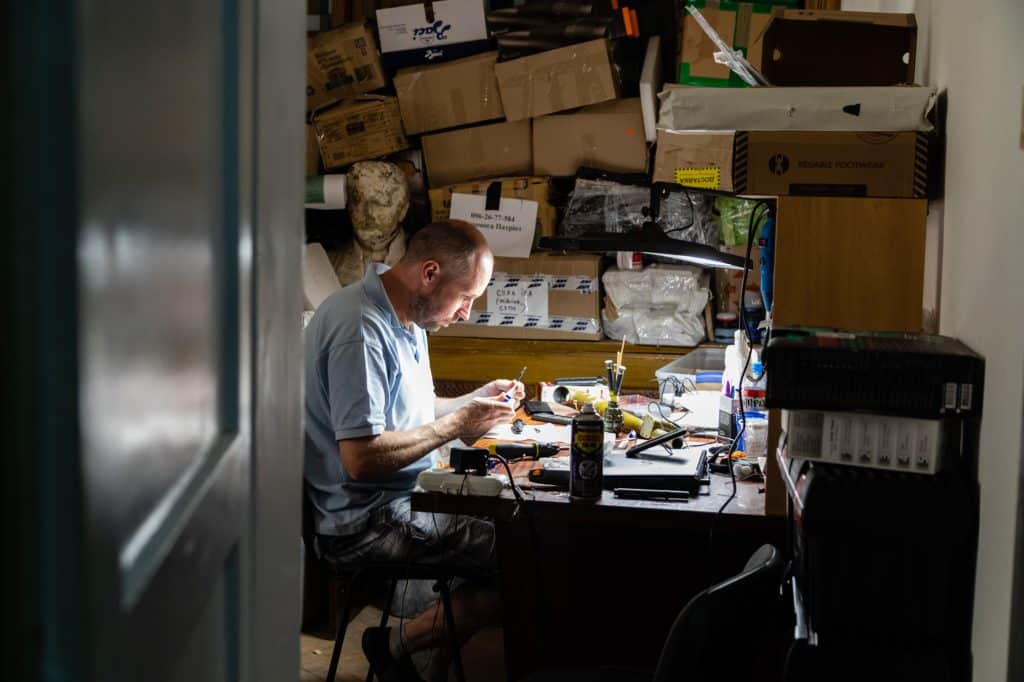
There are also people who have joined the organization recently. Take for example Olenka, who moved from Zhytomyr to Lviv right after the full-scale war began. She is originally from Donetsk province and used to serve in the military. Her husband still serves there. He is Andriy’s friend. Olenka came to Andriy and told him she wanted to make herself useful.
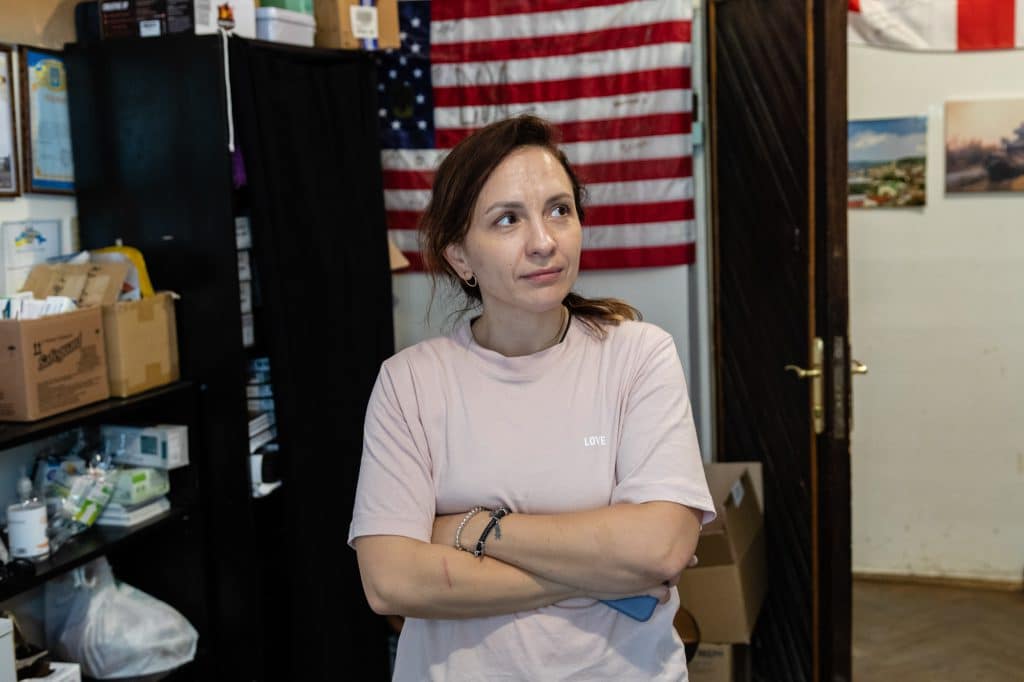
The team of the «Lvivsky Lytsar» had been preparing for the full-scale invasion in advance. They understood that there would be a major influx of people in the first weeks of the invasion. Thus, they were also focusing on the humanitarian aspect of their usual work.
And now they have resumed completing their main and usual tasks, namely, provision of regular and optical devices, equipment, etc. These fields of work were identified as priorities back in March 2014 when the team of the organization were delivering warm clothing for Ukrainian board guards serving at Chonhar (a village in Kherson province — translator’s note).
Andriy remembers a phrase that some of his colleagues coined at that time, «You need socks in war, but you won’t win it just because you have them». Also, Andriy and his friends have technical education, which has often helped them figure out what spare parts they need when acquiring and constructing devices for the military. The organization’s priorities now are artillery, intelligence and snipers. Andriy says that currently his team are in dire need of money and used laptops and smartphones, which they then fix and pass on to Ukrainian defenders.
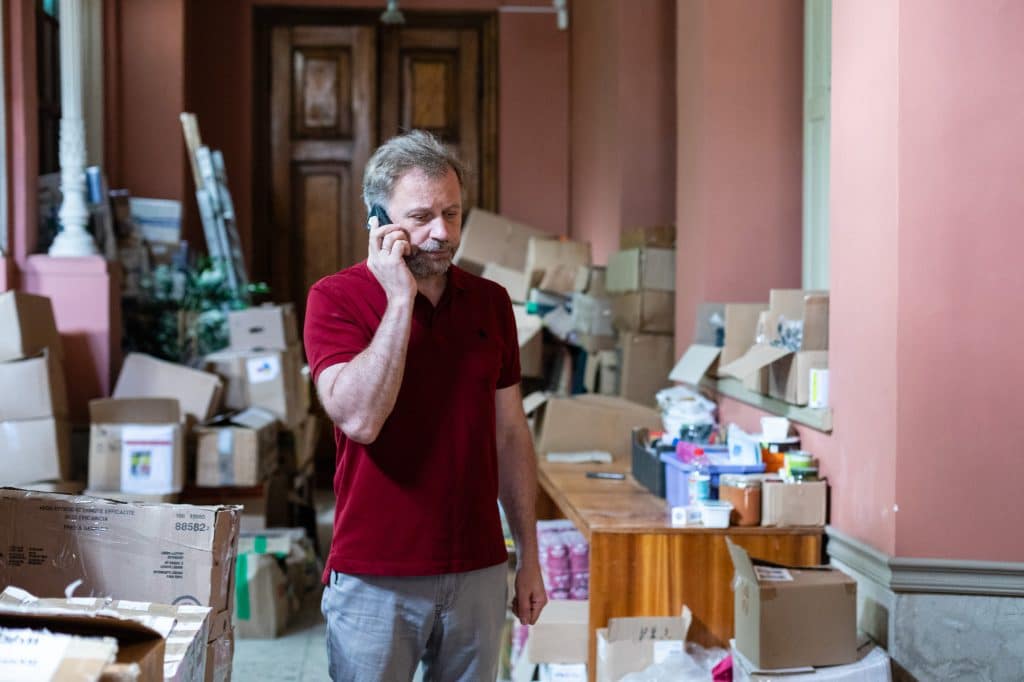
Our conversation with Andriy is often interrupted. Soldiers come to consult with him about equipment or to ask something they really need since they are about to leave for the front. A few minutes later electric generators were brought in. Andriy says the thing that motivates him most of all is gratitude expressed by the military and their loved ones for delivering equipment that saved soldiers’ lives.
«The feeling that you had when you were a kid waiting for a present under the pillow on Saint Nicholas Day is the same that we get every time we deliver necessary things to the front».
When the topic of the motivation of helping to keep on volunteering came up, Andriy thought of his family. His maternal grandfather was incarcerated as a political prisoner. He was nearly executed and eventually deported to Siberia. His father’s entire family was also sent to Siberia because they supported the Ukrainian Resistance Army.
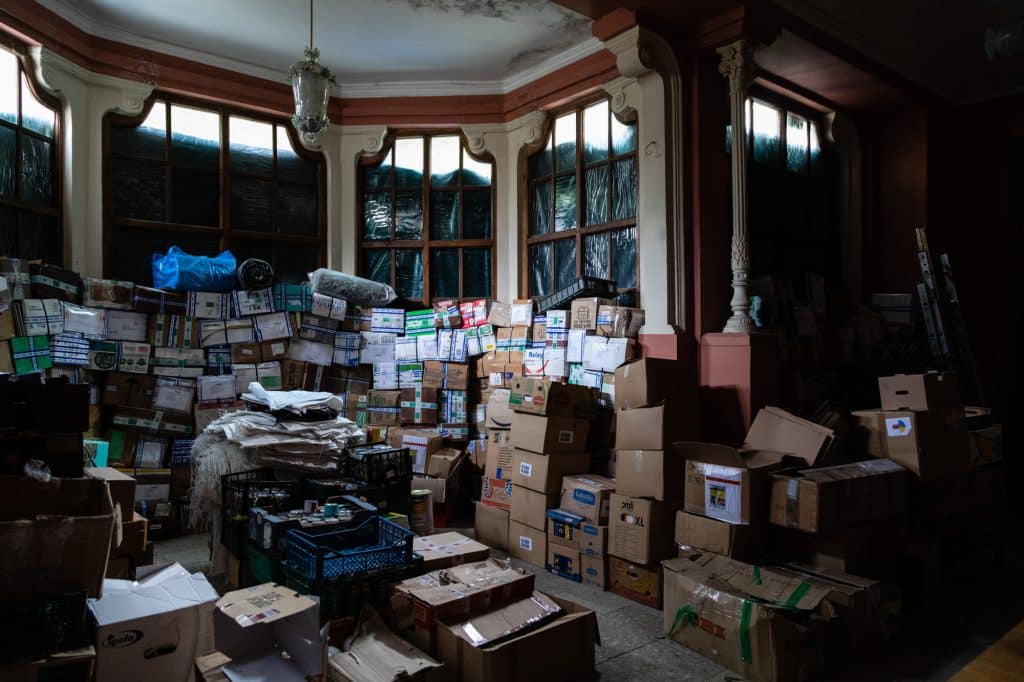
«In my childhood I often listened to my relatives singing riflemen’s and rebels’ songs. I knew that my grandpa had been sent to Siberia because he had fought for the Ukrainian state. The question of statehood has always been important to me. I have always been aware of it».
Together with his friends Andriy founded the organization «Studentske Bratstvo» to restore graves of fallen Sich Riflemen (the first regular military units of the Ukrainian People’s Army – translator’s note). He then took part in the Revolution on Granite (a student protest campaign that took place in Kyiv, Ukraine, in October 1990 – translator’s note), Orange Revolution and Revolution of Dignity. Alongside his team Andriy is doing everything he can so that Ukrainian soldiers have weapons to fight their enemy. In parallel to this, whenever he has a spare minute, he keeps himself busy with his professional duties, i.e. restoring a church in the village of Kuhaiv, Lviv province. Andriy is dreaming of devoting himself fully to this job after the victory.
In the meantime he carries on helping the army because he is sure that,
«If a Muscovite comes to us, we will have no culture, no heritage. Ukrainian boys and girls are taking care of our cultural heritage, fighting on the front with rifles in their hands.»
Women’s solidarity during the war
The organization «Zhinochi Perspektyvy» (the Ukrainian for «Women’s prospects» – translator’s note) came prepared for the full-scale invasion thanks to the experience it had obtained. Its mission is the protection of women’s rights and ensuring gender equality. The organization has been standing against domestic violence and people trafficking since 1998. Since then its team has organized a number of shelters, having also established strong cooperation with Ukrainian and international human rights organizations and learned to be self-dependent.
Deputy head of the organization and also a psychiatrist, Marta Chumalo, says that previous experience her organization obtained while helping women has been crucial. At the same time, the full-scale war has posed its own challenges to «Zhinochi Perspektyvy».
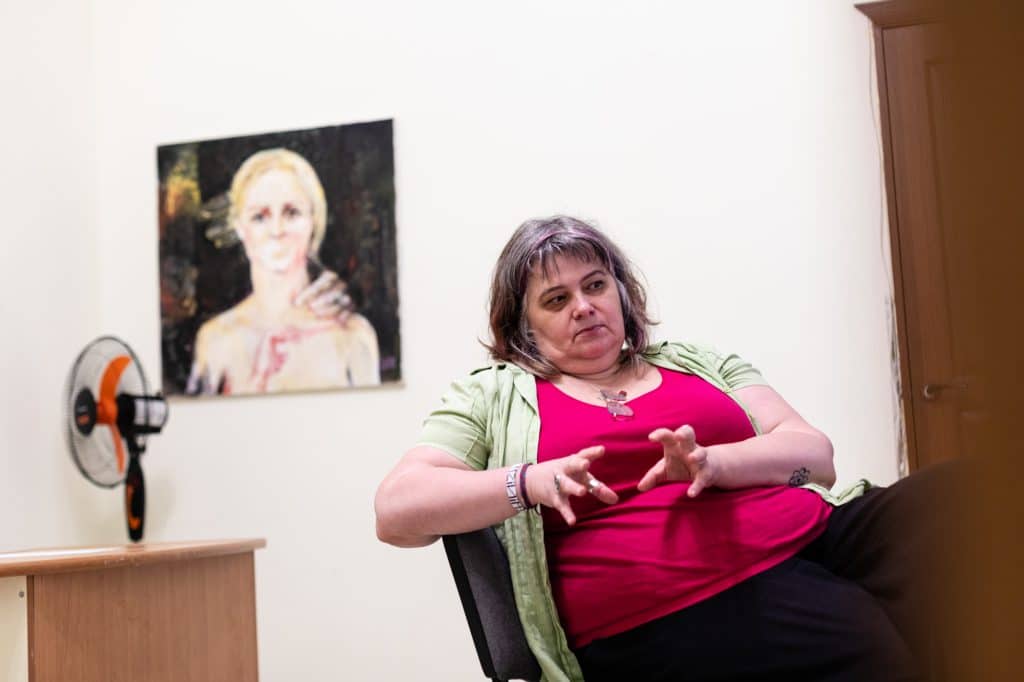
«On the first day I took myself to the railway station to volunteer. What I saw there was a huge volume of work. We then started considering options of setting up new shelters», says Marta.
The first shelter for forcibly displaced persons was opened on Fedkovych street nearby the railway station. This was a provisional solution meant to offer shelter for people for a few days, which was especially relevant in the first days after February 24. Following the same principle the organization refitted its office in the first weeks of the invasion to accommodate people fleeing the city of Volnovakha. They then set up a shelter on Zelena street. A building was being let there, and as soon as its owners learned about the idea of a shelter, they offered the building for free.
As of now in Lviv province there are 7 shelters for internally displaced persons put up by «Zhinochi perspektyvy». A new shelter for women suffering from mental illnesses and fleeing from war is going to be opened soon. Shelters launched by «Zhinochi Perspektyvy» are mainly meant for vulnerable women with children, but they also sometimes accommodate entire families with men. First of all, these shelters accommodate the most vulnerable women, for example, those with disabilities or who have been subjected to violence.
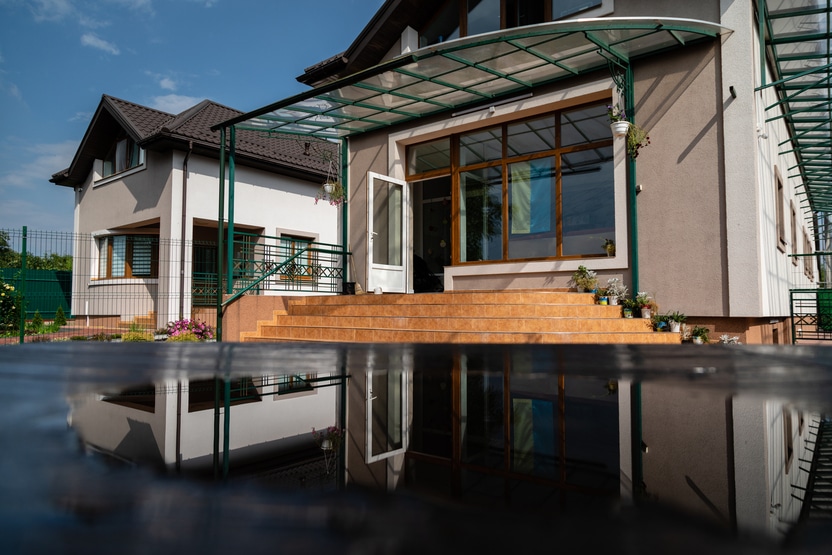
«We’ve got a woman living here who has three kids with disabilities. One of her daughters has almost completely lost her eyesight, the other one’s hard tissue of the jaw is missing, while her son suffers from epilepsy. The woman herself has been affected by domestic violence. She can’t return to her home in Chernihiv province in view of the abuser living there», says Marta Chumalo.
Marta recalls a few difficult cases when some women were not only fleeing from war and violence, but whose abusers kidnapped their children. Thanks to the gained experiences and a network of contacts, «Zhinochi Perspektyvy» manage to help people. For instance, its team has managed to find a safe place abroad for one of these women whose child was returned to her. She is getting on her feet there, planning to resume working in the medical field, just like she used to in Ukraine.
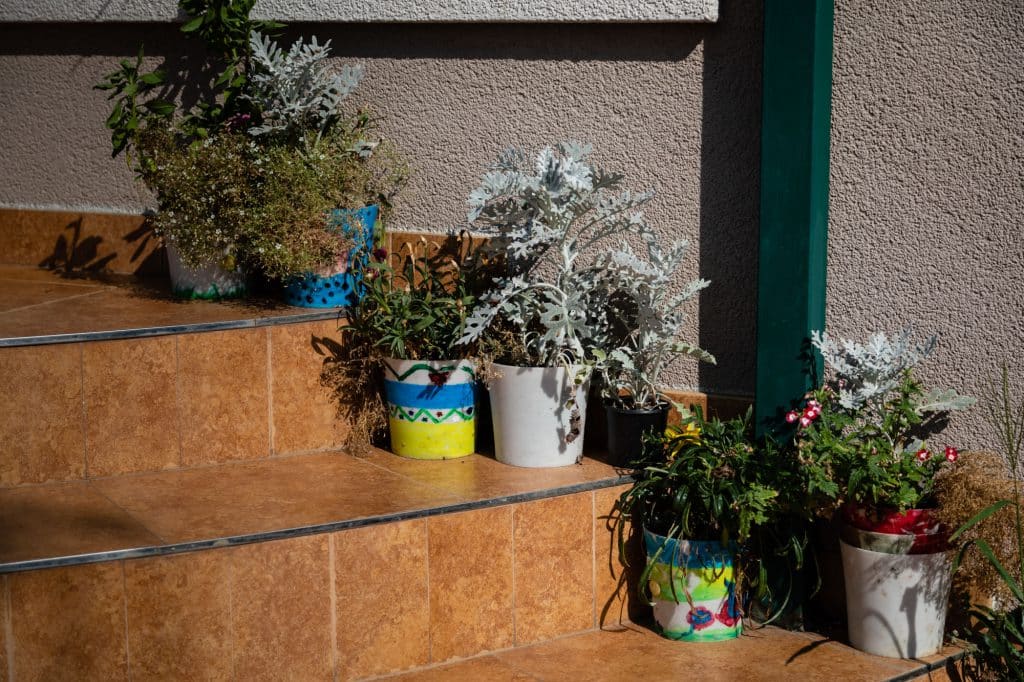
«We have received strong support from abroad. We are also supported by Ukrainian female activists who have fled abroad. We have launched a platform Women for Woman on which women can provide direct help for other women. Before the full-scale invasion an offer for help would be published there once a week. Now, the number has risen up to several hundred over the same time period. We want this solidarity to grow stronger».
Marta, just like other volunteers, feels exhausted at times. Nonetheless, she recalls organizing a feminist camp for girls in the Carpathian Mountains. She says, «It is for the sake of these youths that you realize that this happens for a reason».
We are heading to one of the shelters for forcibly displaced persons located in Lviv. It was organized by the team of «Zhinochi Perspektyvy» in May 2022. It is a spacious and bright two-storied house with 9 rooms, a kitchen overlooking the stables, shower rooms and a conference hall refitted into a bomb shelter. In the hall Valentyna and Natalya, who have come from Donetsk and Luhansk province, are molding cookies that will be delivered to Ukrainian soldiers.
From time to time the shelter is visited by therapists and professional advisors who help its inhabitants feel safe and move on. The principle of work of this and other shelters launched by «Zhinochi Perspektyvy» lies in the approach of minimal interference.
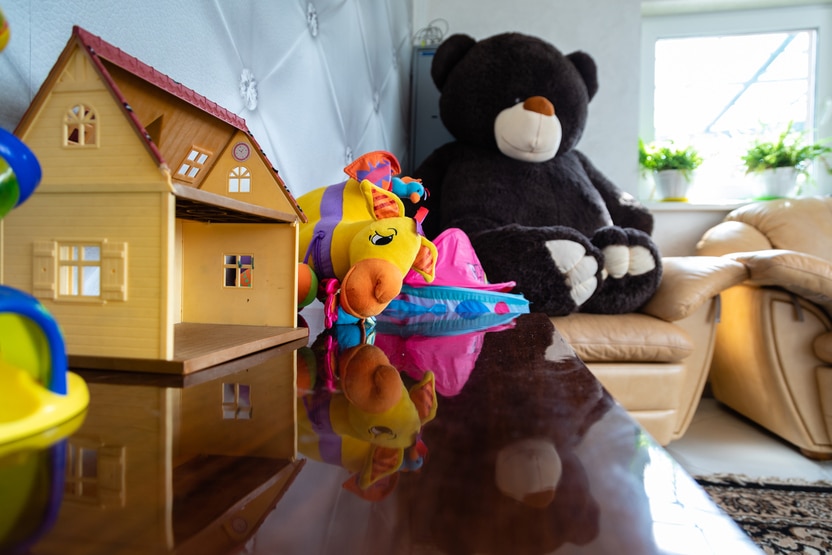
People cook for themselves here and go about their business. They organize their leisure here as well by weaving masking nets for soldiers, making bracelets and then donating proceeds to the Ukrainian military. They make picnics nearby.
At first, children who arrive at such shelters are quite sensitive to different irritants. However, with time their mental condition stabilizes and they grow stronger. The administrator of the shelter, Oksana Karpinka, says that after the first kids arrived at the shelter, she came up with an idea for entertainment. She offered them to make pots for plants in the shape of houses. They then put these plants into the pots, giving them names and making up their stories. That is how children’s sense of safety and home was developed.
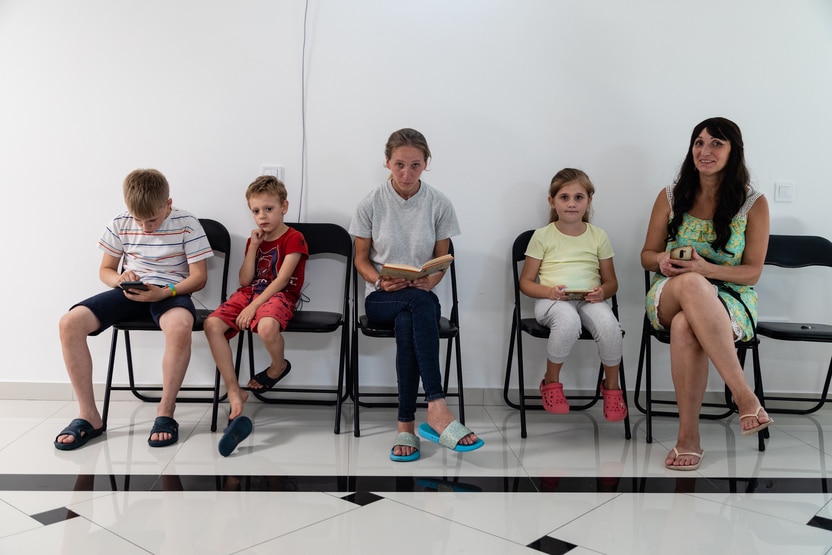
The administrator of the shelter, Oksana Karpinka, used to work at the organization as a therapist. Although she is not practicing her profession now, it does help her find an approach to different people. She says,
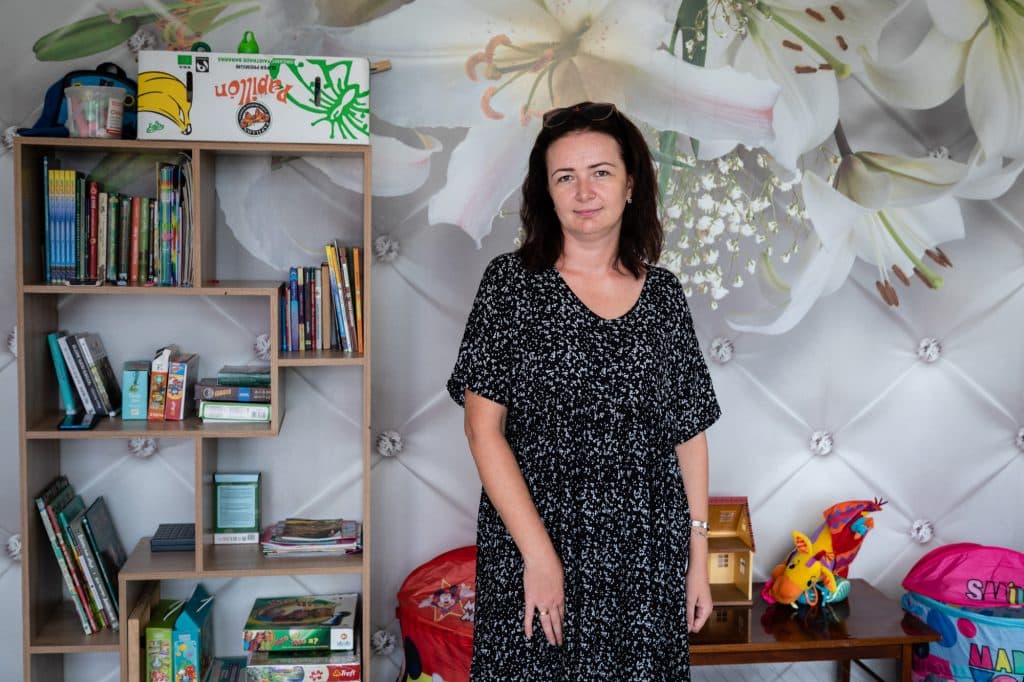
«I try to take every sore point into consideration since I know every story of these people, I pay attention to their resources and positive sides. After enduring such stress one may lose their heart and feel desperate. Therefore, I keep telling them that it is them who have managed to flee shelling and arrive at the shelter so that they don’t get stuck in this state of helplessness».
Kharkiv. The unassailable city
At about 9 in the morning, August 23, on Ukrainian’s Flag Day, a large bus from Kharkiv filled with people pulled in at the Lviv Railway Station. Previously, they had been able to get out of temporarily occupied territories of Kherson and Zaporizhzhia provinces. The organization «Ukraine SOS» helped them to reach Lviv.
It took many of them several days to cross fields, Russian checkpoints and get all the way from Zaporizhzhia to Lviv. A trip to the Polish border lay ahead. Most travelers were slouching because of tiredness. Some were asking for further details about the continuation of their trip. A boy was sitting on the curb, crying. Two schoolgirls who had come from Oleshky, Kherson province, were holding a blue-and-yellow flag above their heads. They had bought it in Zaporizhzhia.
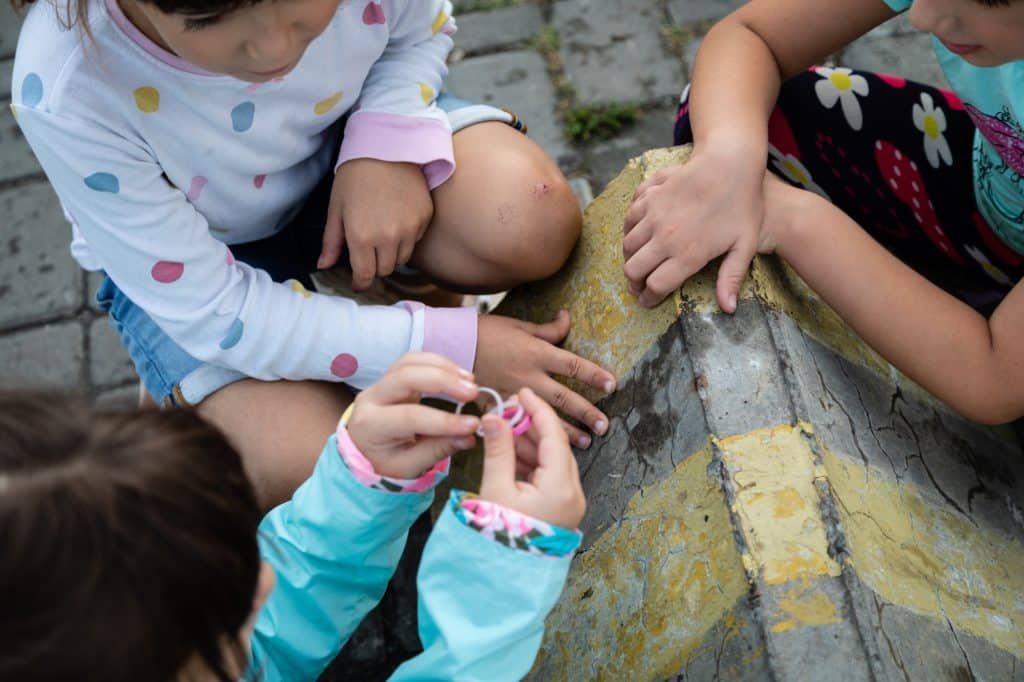
Meanwhile, Sofiya and Yulia (two girls aged about 7), were jumping and smiling in front of the camera. They had got acquainted with one another on the bus and were now searching for a thread with which that would bind with two rings of friendship which they had made while traveling on the bus. I tear a thread off my handkerchief, holding out my hand to one of the girls. She thanks me and runs off to her new friend.
Mother of one of the girls, Lena, tells me the story about how they evacuated from Skadovsk in Kherson oblast:
«We managed to escape by a miracle. Even the air smells different here! Back there Russians check people’s IDs, chat history on their smartphones. Our city was not as horribly bombed as Kharkiv or Mykolayiv. However, we did see missiles being launched. Russians were transporting them on the road. We were watching them do this, unable to do anything ourselves. It puts you under mental pressure».
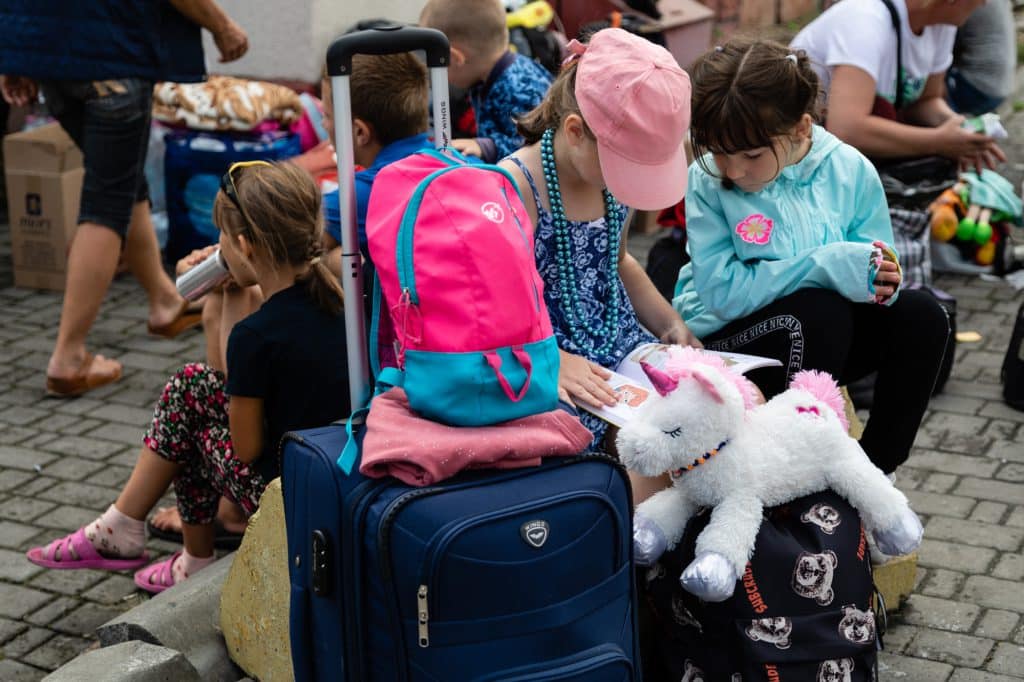
Volunteers of «Ukraine SOS» are helping people who have lived through Russian occupation to the sound of their tears and laughter. The volunteers‘ task is to provide the people with information, comfort them, and make them feel safe until the next evacuation bus arrives.
A volunteer from the organization’s PR-department, Bohdana Soltysyuk from Lviv, introduces me to them. Before the full-scale war Bohdana studied at the university, in parallel working as a model. At some point she was planning to move abroad. However, after the war broke out she decided to change her plans. She stayed in Ukraine, searching for ways to make herself useful. At first she helped weave masking nets and entertain children who had fled Mariupol. She then joined «Ukraine SOS». Bohdana answered phone calls in a call center. Her next task was writing posts on the organization’s Facebook page. She is now in charge of its PR department.
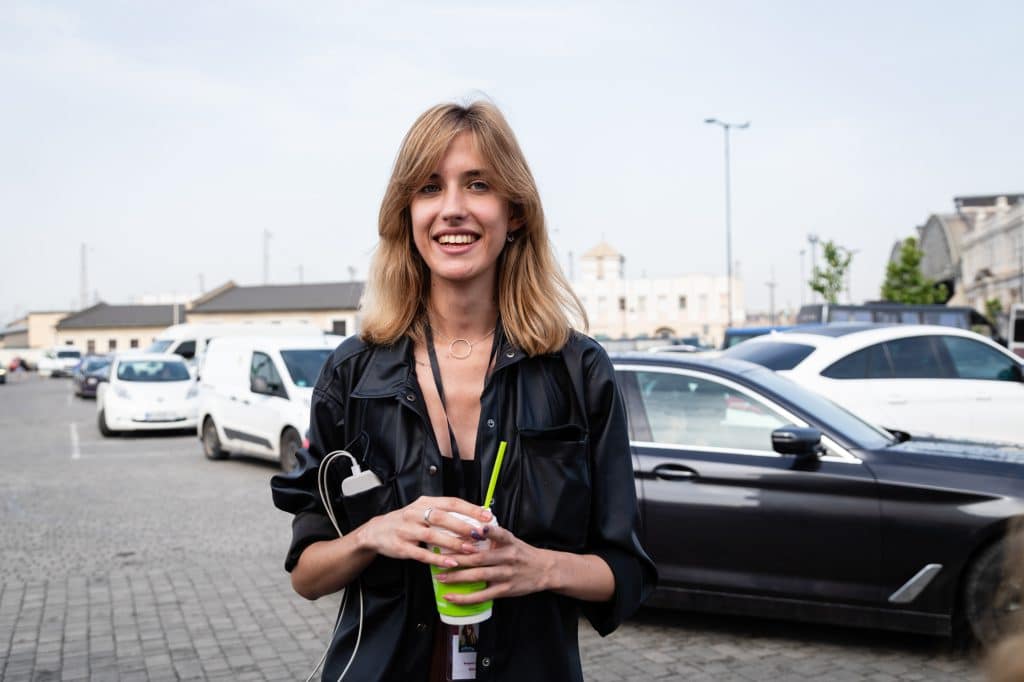
A volunteer, Illya Tochechnyi, fled the city of Kostyantynivka and moved to Lviv province. Some time later he joined «Ukraine SOS», volunteering in the call center. On the day of the interview he was helping with the evacuation of people for the first time.
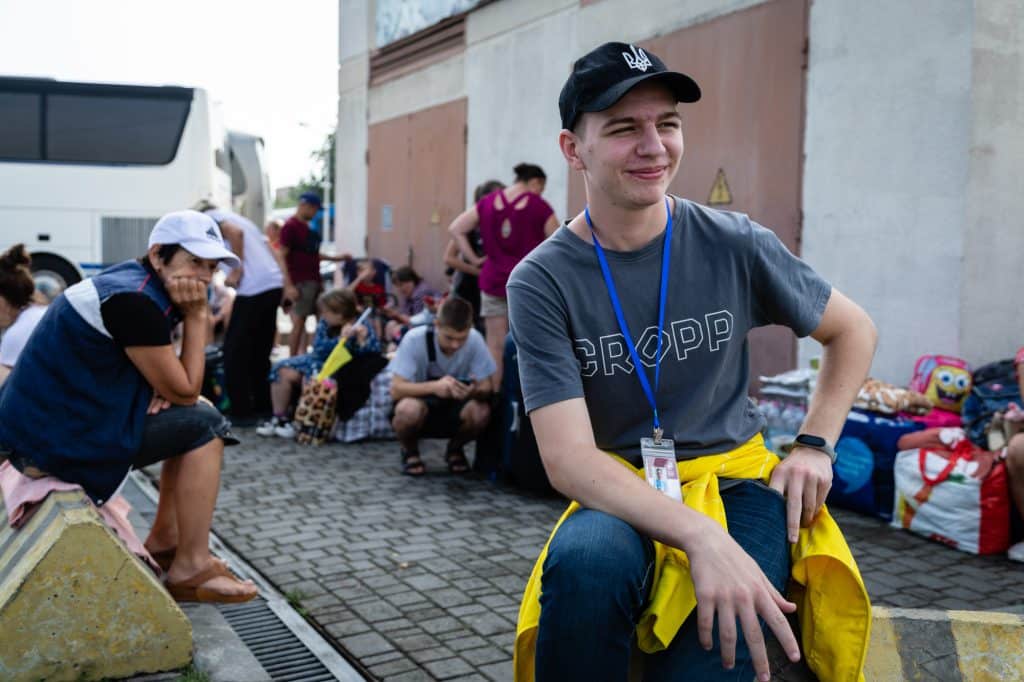
«Here you understand what people need the most. Being here, I can provide as trustworthy information as possible. Currently I am counseling people on how they could settle down in Poland», says Illya.
Vitaliy Lyovin volunteers at a warehouse close to the organization’s office. He is originally from Chuhyiv, a city in Kharkiv province. He worked 15 years at a printing company. After February 24 he took his family to Lviv. Here he began volunteering.
«Sitting at home and doing nothing in the times of war is tantamount to increasing burden on the whole system. I, however, make myself useful here and don’t go crazy doing nothing», says Vitaliy.
The founder of the organization, Oleksandr Shevchenko, just like many other volunteers, has come here from Kharkiv, which is why at first the organization was called «Kharkiv SOS».
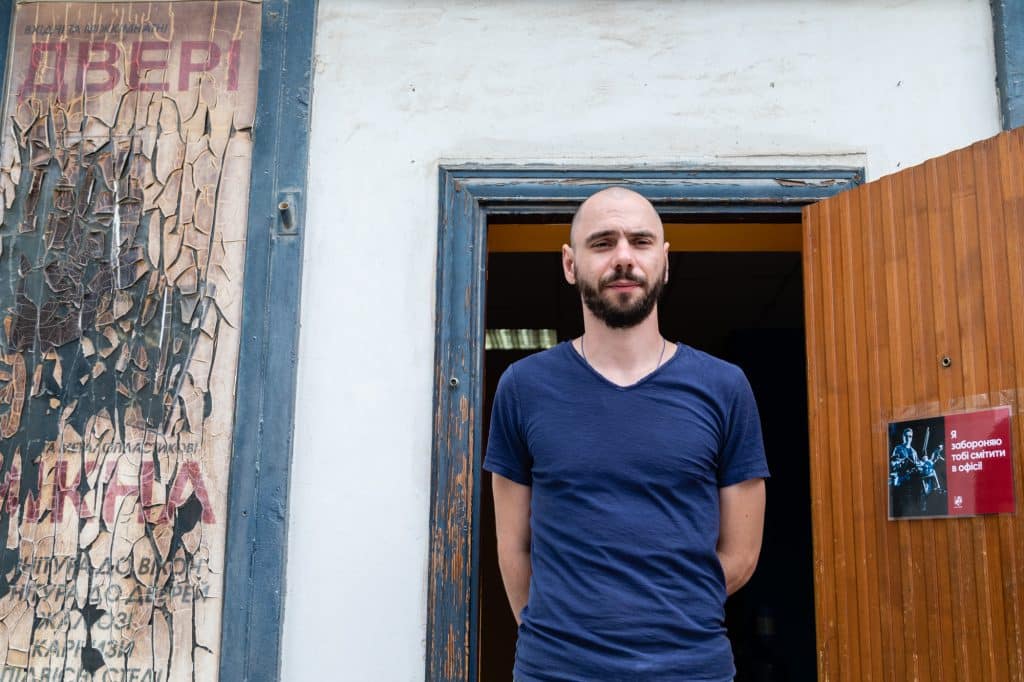
Having come here, the following day Oleksandr set about telling his friends about ways to evacuate safely. That was how an improvised call-center came into being.
Afterwards he moved to Lviv and alongside other volunteers began helping people in a more systematic manner. Now, apart from informational support through the call-center, Oleksandr and his fellow volunteers evacuate people, provide humanitarian aid and military equipment. He says that his work pivots on the cooperation between different people and groups. Some of them ensure humanitarian aid while others find cars and drivers.
Oleksandr has been active in civil activism since the Orange Revolution in Kharkiv. Here is how he explains what motivates him to carry on doing this today.
«That’s the only way to help the country. All working businesses and the middle class of Kharkiv have come together. Kharkiv is unassailable. You can even drop a nuclear bomb on the city. It will stand nevertheless».
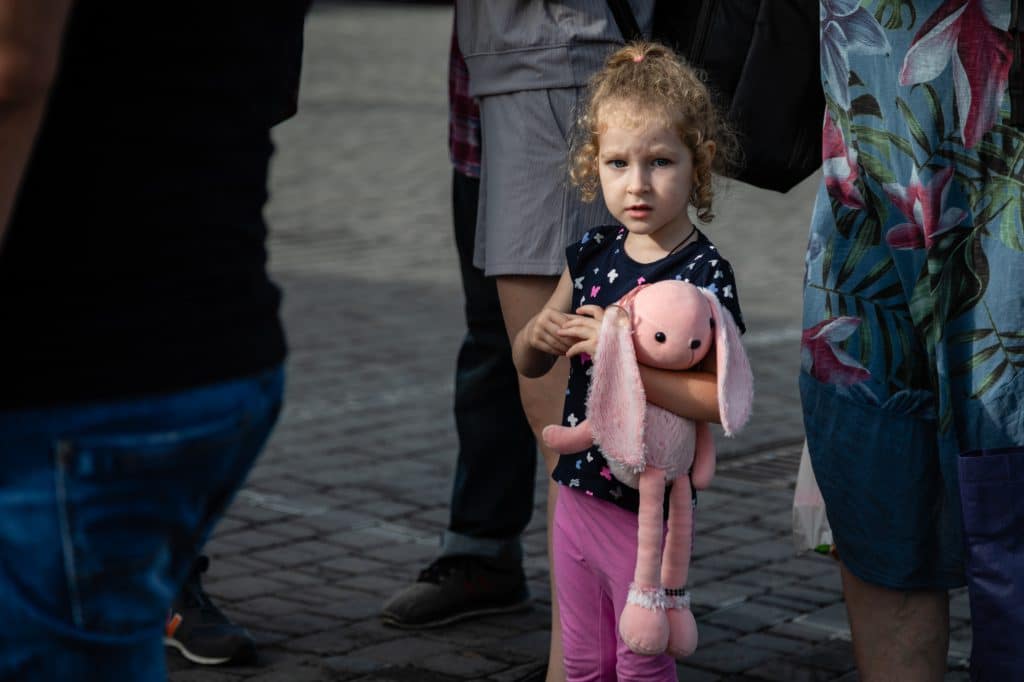
Things to do in Lviv
Places to visit
The Les Kurbas theater located on Les Kurbas street 3. A new (35th, to be precise) season opened on September 2. For safety reasons, visitors are required to have passports with them. In the event of an air raid, the play is suspended and visitors are asked to proceed to a bomb shelter.
At the Lviv State Academic Theater of Opera and Ballet, which is located on Svobody Avenue 28, the agenda of a concert by Ukrainian musicians Tributes to classics was presented on September 4. Previously, the musicians had performed at Kyiv Bouquet Stage. Works of Joseph Haydn and contemporary composers, such as Yevhen Stankovych and Valentyn Sylvestrov, were on the program.
At the Andrey Sheptytsky National Museum of Lviv (Svobody Avenue 20) Maria Pryimachenko’s works will be exhibited until October 30. Internally displaced persons from other regions of Ukraine may visit the exhibition free of charge.
Where to eat
The coffee shop «KIT» (the Ukrainian for «cat» – translator’s note) is located on Ruska street 3 and Lepkoho street 6. It was opened by Serhii and Ivan who are from Irpin and Borodyanka respectively. The shop offers its specialties, namely, pies, galettes and Cinnabon rolls. A sign placed near the shop’s window reads, «Serhii and Ivan welcome you in our shop. We have come from Irpin and Borodyanka. We do what we do best – cooking delicious food and brew coffee. Support us! We support the Armed Forces of Ukraine».
Pershyi (the Ukrainian for «first» – translator’s note) is a bistro that positions itself as a ‚short story about Kharkiv in Lviv‘. It is to be found on the Dzherelna street 30. Almost all members of its team have come to Lviv from Kharkiv. The atmosphere of the bistro and its food remind the visitors of the Ukrainian city in the East.
Coffee shop «0629» is a place offering shawarma. It was founded by three friends fleeing the war, Oleksii Korzh from Chernihiv province, Kostyantyn Ponedilchenko and Volodymyr Mihas from Mariupol. The number «0629» stands for the telephone code of Mariupol. The shop is located on Yana Zhyzhky street 7.
Services
The coordination aid center that was set up by the Lviv province military administration can be reached 096 232 81 93. Those in need of a shelter, accommodation or humanitarian aid may call at 068 414 79 63; 097 182 18 60; 097 347 44 59.
Molodvizh is a free co-working space and lecture hall situated on Chaykovsky street 31. Here you can meet fellow thinkers and get the opportunity to volunteer. Internally displaced Ukrainians can also find help there.
The Lviv Art Residence is located on Subotivska street 1. It has been refitted into a shelter for forcibly displaced persons. Volunteers and displaced persons are forming a local community while also creating its space. Half of the proceeds obtained from selling works of art owned by the art space are spent on the development of the shelter, with the other half being donated to the Armed Forces of Ukraine. The Lviv Educational Foundation is a charitable foundation that unites a number of volunteer movements and initiatives, such as BUR, «Leadership and Service», «Community for Family». The foundation’s headquarters are located on Kolberha street 3a.

